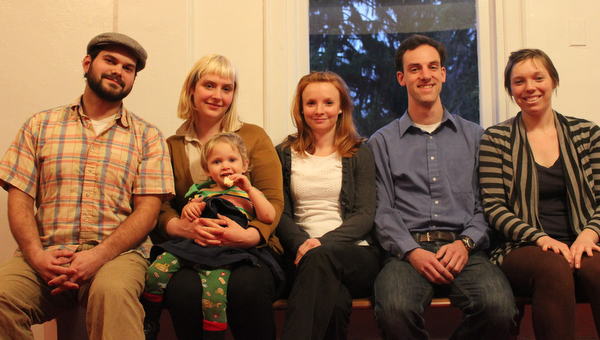
When the kids are in charge
A “free school”
“When I was 10 I decided I wanted to start a school,” says Jean Marie Pearce of Bloomfield, one of the founders of Three Rivers Village School for students in grades K-12, which opened in September in a former Stanton Heights church. “I thought school should be better than this.”
Pearce has experience working in a drop-in center for homeless and at-risk kids and at a “free school,” such as those already running in Philadelphia and Harrisburg, which allow staff and kids to choose day-to-day activities and teach the kids only what they say they want to learn. Both experiences, she says, inspired her to create “student-centered and student-focused education models that help people become independent.”
You won’t encounter the chaos most might picture when they hear about this model, Pearce says. When walking into a free school – where the staff and students vote on rules and students direct their own lessons – “people are immediately impressed with how engaged students are with each other and the world, and how much they are enjoying themselves.”
“As adults, when you first go into the [free] school, sometimes you don’t know what to do, because everyone around you doesn’t need you,” she adds. “But it’s all very obvious that they’re not wasting their time. We don’t really give ourselves enough credit in our society for how curious people are, and how passionate they are about life.”
But how do the youngest kids understand enough about the world to know what they need or want to learn?
“When people are ready to learn something, they are much more engaged and can learn it faster,” Pearce points out. “Look at where early education is going now – it is very play-oriented. We’re saying where a lot of people learn best is through play, whether they are five or 10.
“Young people want to become successful adults. Part of being an adult and becoming successful in the world is learning to read and learning arithmetic. You’re motivated to learn it – especially if you aren’t made to learn too early and are scared off. My hopes are to have a place where children have a chance to thrive …”
Inside the school
Co-founder Evan Mallory, a freelance computer programmer in Squirrel Hill, says the 28 current students, ages 5-15, are doing well in the unfamiliar school environment. He, Pearce and the other founders are its two full-time and two part-time volunteer teachers. Tuition for this parochial school is $8,000 a year, with a “steep” discount for those with a lower income, he says.
“Some of the younger kids were acting like they felt at home right away … making new friends and getting busy, happy and active,” he says. “And the formal structures of the school are developing.”
The justice committee meets every day. “I’ve been surprised at how boring a discussion of rules is to someone under the age of 10,” Mallory allows; it’s mostly staff and older students taking part in the democratic process. On day 1, for instance, the school discussed their computer use policy. They decided that, if all computers are occupied, a student must request to use a station, forcing the current occupant to leave within half an hour. Mallory doesn’t like the policy, having noticed some kids are wary of asking for computer use in that way. He expects the school will eventually vote to change this procedure.
“The adults are going to be awfully persuasive,” he adds. “The staff will offer or suggest some activities. But we would be totally okay if we said, ‘Who wants to go swimming today?’ or ‘Who wants to go to the natural history museum?’ and everybody said, ‘Not me.’ We will be leading in making sure it is a healthy community and making sure everyone is treating each other with respect.”
Meanwhile, the kitchen committee and the art room committee have devised workable rules and “these groups are doing good things. There’s been a lot of social development from meeting a lot of people of all ages and getting along.” The younger students in particular, he believes, are developing “a lot of responsibility in the way we thought they would.”
Reading and writing practice happens often; even math lessons are requested. The older students have chosen to create hand-made, illustrated books; the younger students are asking to be read to. “And I’ve had a lot of fun with a five-year-old by making videogames,” he says.
Creating a school from scratch
Co-founder Jancey Rietmulder-Stone, a social worker of Squirrel Hill, says their school building was chosen for its green space outside and because it is just blocks away from Charles Dinan Memorial Park.
The free school model, she says, “allows for genuine and strong relationships between the staff and the students, and the students and each other.” The lessons will evolve naturally, she says, from the mechanics of building a sheet and block fort to the art of illustration in the art room to the mathematics of cooking cooperative meals: how will the kids share flour, sugar and other baking supplies?
“They may figure out that they need trigonometry for something,” she says. “But if they don’t, that’s okay. They may never need it.” Perhaps a student will express an interest in science fiction, which will result in a field trip to the library – or a lesson in videomaking.
“We’re not going to have bells ringing every 45 minutes to tell people to stop what they’re doing and do something else,” Mallory says. Nor will there be mandatory tests. “Kids are welcome to ask for an assessment of their abilities,” or for sample tests and SAT coaching. “But all of that testing process will be led by the student.”
The school opened with a collection of general interest books, basic science equipment, an art room and a piano in the basement. “To a great extent, we’re going to wait and see what specialized equipment we want,” he says. “I’m sure there will be ideas that people bring in from outside of school that people will want to start investigating.”
The school also plans to use the city as its classrooms, travelling to the nearby Union Project for pottery lessons or bringing in “guest staff members” to teach subjects current staffers don’t know.
“Kids realize what is valued by the culture,” concludes Rietmulder-Stone. “They are aware of what is going on in the world and the skills they need to be an effective adult.”‘
The bottom line, Mallory says, is that “people take for granted that kids are going to hate school – but at least it’s going to be over. We want kids to be as happy here as they are on summer vacation and not because they are eating donuts.”
Adds Jean Marie Pearce: “I really want to see how youth voices and youth choices are taken seriously in this community. I think they can rise to the challenge, given the opportunity. I would love to see more youth advisory boards in the city. I hope we can influence the conversation in Pittsburgh.”
